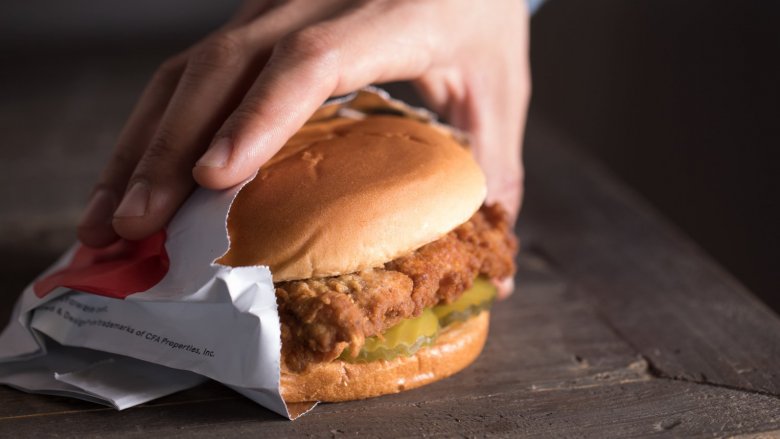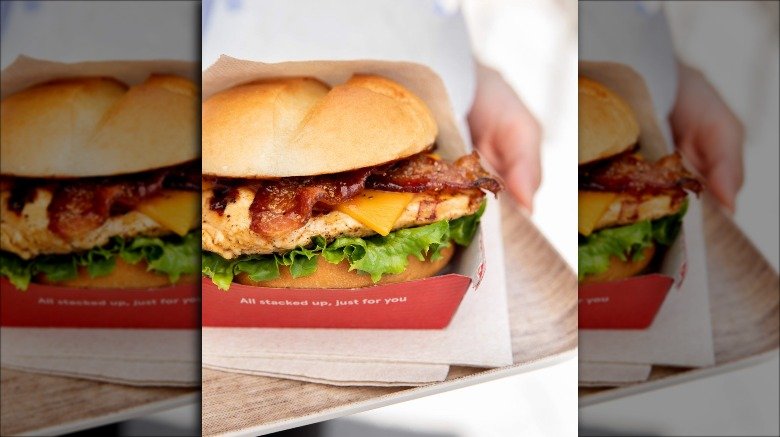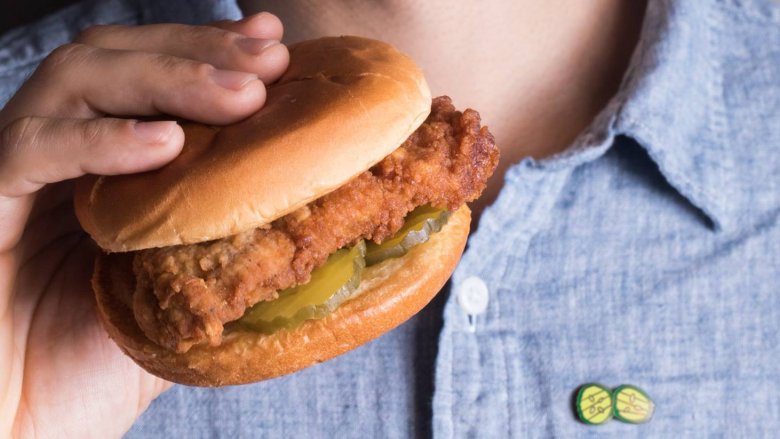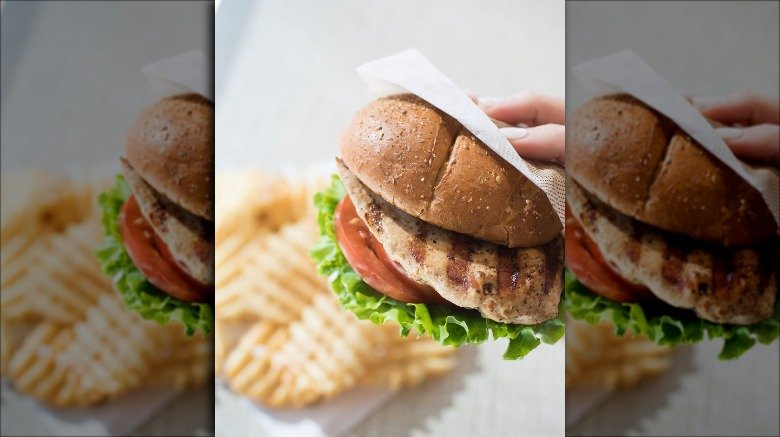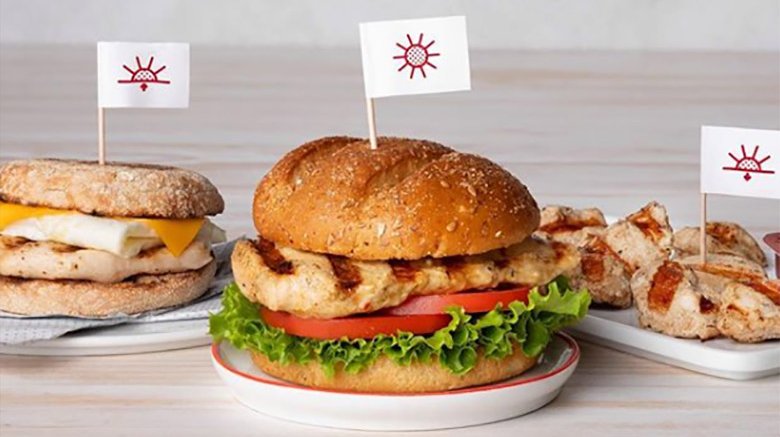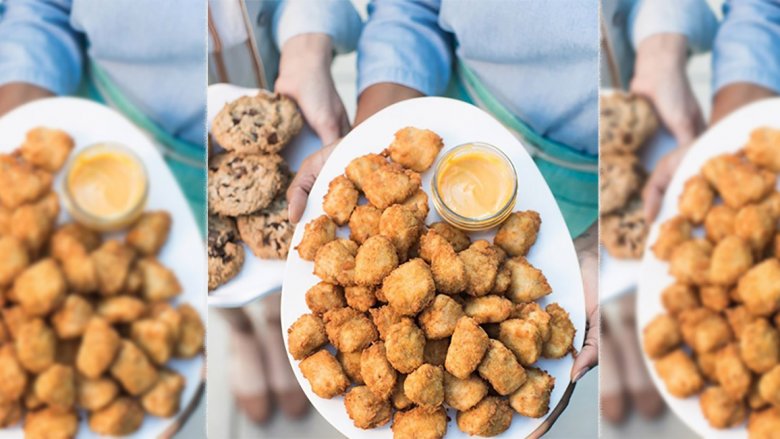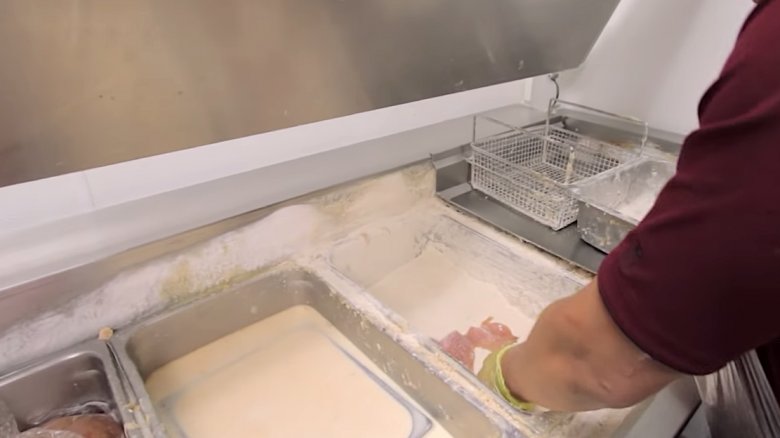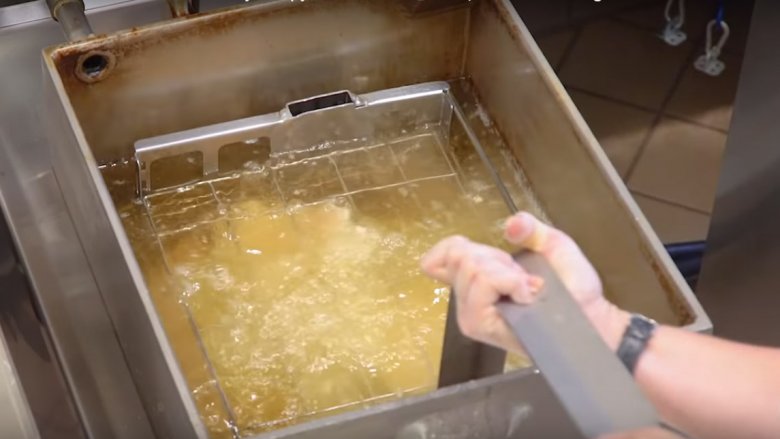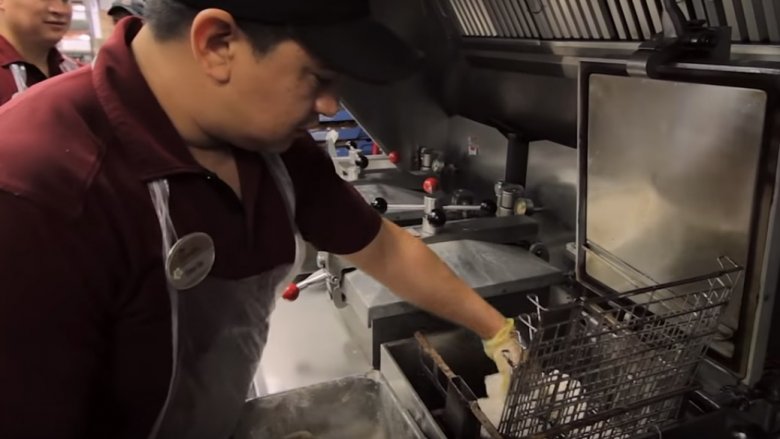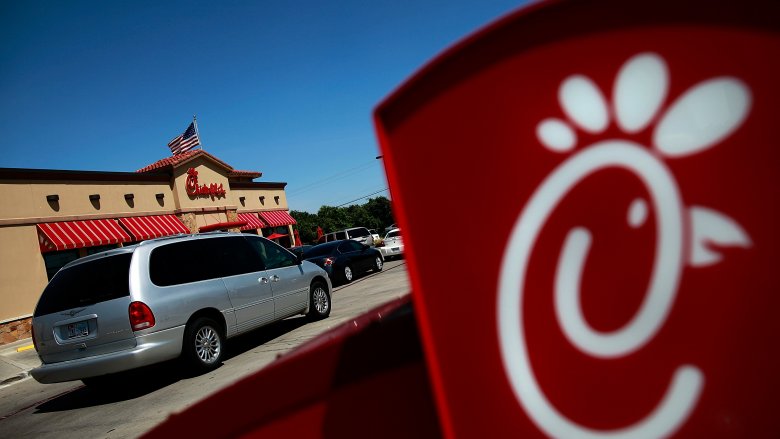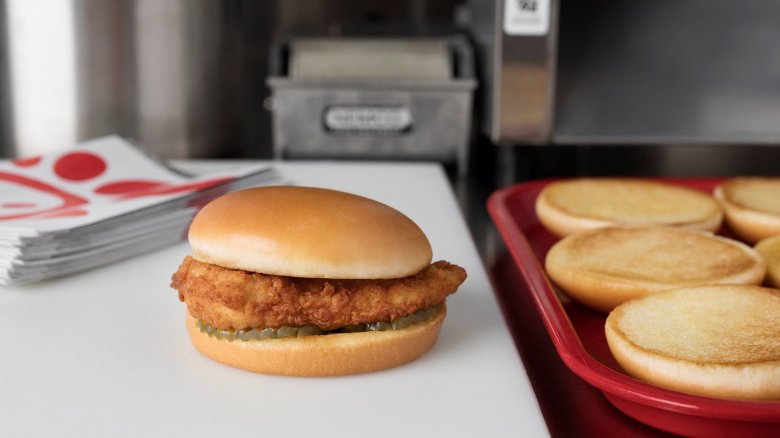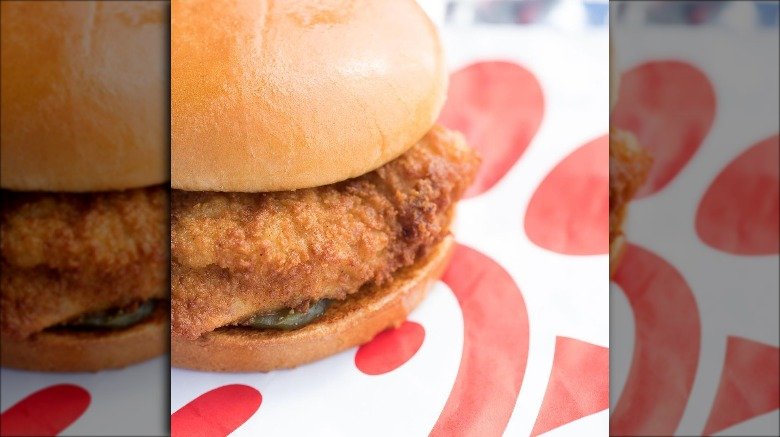This Is Why Chick-Fil-A's Chicken Is So Delicious
Make no mistake about it, Chick-fil-A is on the warpath to become the biggest slinger of fast food chicken in the United States. Despite the controversies that have, at times, threatened its empire, Chick-fil-A continues to draw wrap-around-the-block crowds because of its chicken. The Atlanta-based chain has been cranking out chicken sandwiches for over 50 years and the process for making its fried chicken hasn't changed all that much from how founder S. Truett Cathy was doing it in 1964.
On the surface, Chick-fil-A's fried and grilled chicken may not seem all that difficult to make. However, there's a lot more preparation and meticulous execution involved than simply throwing a chicken breast into the deep fryer or onto the grill. If you've ever been curious as to why your car seems to steer itself into Chick-fil-A's parking lot every time you pass a restaurant, it's the chicken — and this is why it tastes so darn good.
They're picky about their chicken selection
It doesn't take a food scientist to figure out that a good chicken sandwich starts with a good piece of chicken. While some fast food giants have come under fire for the chicken they use, CFA claims to use only the best chicken when creating its menu. Not only does this mean that the company refuses to ever use chicken meat that has been ground or separated, but according to the company's website, its chickens are raised cage-free and are free of added steroids, hormones, and antibiotics, so you can rest assured knowing that you're getting top-quality chicken.
Aside from that, Chick-fil-A chooses smaller chickens because they result in better tasting and juicer meat. "The industry has gone to a larger bird because if you're a chicken producer it's more efficient to grow a bigger bird," CFA vice president of menu strategy and development David Farmer said. "But we don't like bigger birds. We like the texture that comes from the smaller bird. We want the tenderness of that meat." There you have it, bigger isn't always better — especially when it comes to chicken.
Pickles play a key role
Chick-fil-A's classic, and very popular, chicken sandwich is a thing of simplistic beauty. A fried chicken cutlet with two pickles between two buttered buns. That's it, plain and simple with no fancy secret sauce required. One very important aspect that might seem like just a secondary add-on, however, are those pickles. A Chick-fil-A chicken sandwich without the pickles really isn't a true CFA sandwich.
The pickles are made from cucumbers that are pickled for three days before finally making their way to the chicken sandwich and zapping it with the perfect amount of salty, briny flavor. For years, the internet has speculated that Chick-fil-A actually marinates its raw chicken in pickle juice before the breading process, however, CFA has never publicly confirmed this (though former employees have told inquisitive Redditors that's the case). This would make a lot of sense though, because the salty pickle juice would result in a breakdown of the chicken proteins and produce a juicer piece of meat.
As for the pickles on the sandwich, employees are directed to place them side by side, not on top of each other. Which makes sense, as this would more evenly distribute that pickled goodness. "They date, they don't mate," Alexa Griffith, who works within CFA's corporate cuisine sector, jokingly said.
They have their own special kind of grill
One might think that just any old grill would do when it comes to creating Chick-fil-A's grilled chicken sandwich, but that's not the case. Chick-fil-A wanted their chicken sandwich to taste like it just came off a backyard grill and there simply wasn't a commercial grill on the market that could deliver that exact taste with their chicken. To make up for it, CFA poured $50 million into developing their own special grill.
Even for a business that revolves around chicken, that sort of investment might seem like a bit of overkill, but the company wanted to make sure the 2014 relaunch of their grilled chicken sandwich was in a league of its own. This $50 million grill is patented by the company and uses a hydraulic system to close and lift the lid that covers the chicken ever so gently. This ensures that it doesn't squeeze out all the juices from the breast meat while cooking. Unlike a typical backyard grill, the CFA grill cooks both sides of the chicken at once, while still leaving those appetizing grill marks that hopefully make it taste like a really good piece of chicken from a backyard cookout (spoiler alert: it's better).
Their seasoning was meticulously tested
Part of the culinary magic that goes into Chick-fil-A's chicken is the seasoning that helps to really give the meat an extra kick of flavor. It's not something as simple as a dash of salt and pepper, and it took the company years to perfect.
When it came to developing a seasoning that would help CFA's grilled chicken really pop and stand equal with their fried chicken, the company's culinary scientists did extensive testing. "Our previous grilled chicken was good, but not great," CFA vice president of menu strategy and development David Farmer said. "We needed to create something better." This meant meticulously experimenting with some 1,200 different seasoning combinations to get the perfect grilled chicken seasoning mix.
Chick-fil-A of course, won't reveal the exact recipe for its seasoning, but have said that it's a blend of sea salt, lemon, garlic, and various savory herbs. The end result is a seasoning that can be replicated on every chicken sandwich to really bring out that smoky grilled flavor.
The chicken isn't frozen when cooked
There aren't many foods that taste better when they're frozen during the cooking process, and customers at Chick-fil-A can rest assured that their chicken will never be frozen when it hits the fryer or grill.
Whereas chicken nugget competitors like McDonald's do serve chicken that has been pre-cooked then frozen and refried, CFA takes the opposite approach and ensures that their thawed chicken goes directly to the customer after its cooked. Now to clarify, the chicken is frozen when delivered to each Chick-fil-A restaurant, but it's fully thawed before the cooking process ever begins (and never pre-breaded). In fact, each piece of chicken is moved from the freezer to the fridge and allowed to thaw for a full 24 hours before ever hitting the fryer or grill. While frozen chicken can safely be cooked, it tends to take longer and can result in a less evenly cooked piece of meat that simply doesn't taste as good.
It's all about the breading technique
So how does Chick-fil-A ensure that each chicken sandwich has the perfect amount of breading that doesn't come sliding off the meat after a single bite? Well, like just about everything else in their chicken-cooking process, it's all about how that process is done. After each piece of chicken is inspected to make sure it doesn't have any tears or glaring imperfections, it's dipped in a milk and egg wash mixture with the larger end of the chicken breast going in first. The chicken is then laid into a bin with a flour mixture and completely buried. Now, one might think that this is good enough and the chicken breading process is complete. Nope, here comes the hard part.
CFA employees are encouraged to get on their tip-toes and use their body weight to firmly knead the breading mixture into the meat. "To properly bread the chicken breast, one must tilt the whole body forward over the flour bin, lifting the heels and pushing down on the breast with an athlete's might to ensure the most dense and consistent application of the flour," Alexa Griffith of CFA's corporate cuisine said. Doing this to both sides of the chicken breast might be tiring, but makes for a more evenly-coated piece of breaded chicken that helps to create a crispy fried chicken cutlet that can't be beat.
Gotta have peanut oil
It's not just the smaller chicken breasts and pickles that help make Chick-fil-A's chicken so tasty — the oil that chicken is cooked in is also part of the secret recipe. Chick-fil-A cooks all of its fried chicken in 100 percent refined peanut oil. (Don't worry, it's generally not considered allergenic by the FDA.) Because of this, the company buys more peanut oil than any other business in the United States. You can cook chicken in everything from olive oil to corn oil to coconut oil, but there's a good reason why CFA founder S. Truett Cathy chose peanut oil for his chicken.
Despite peanut oil having a nutty and mild sweet flavor, it doesn't pass these flavors off to the foods that are cooked in it, as more strongly-flavored oils might. Thus, the chicken cooked in it just tastes like chicken. This ensures that the flavors of the pickle juice (maybe) and breading on the chicken aren't tainted by the cooking oil, and all the important flavors are free to shine through.
Proper placement in the fryer is essential
There really are no parts of Chick-fil-A's chicken-cooking process where employees are told to just wing it and do whatever they think is best. Even the way the chicken cutlets are placed into the deep-fryer follows company protocol to deliver the best-tasting product possible. Rather than randomly throwing each cutlet into the fry basket, the chicken fillets are placed into the fryers just so.
In order to get a delicious piece of chicken end-to-end, an even cook across the entire piece of meat must be achieved. To make this happen, CFA employees place the chicken cutlets into the basket with the tail-end of the fillet pointing towards the center. This is because the hottest part of the peanut oil is by the coils that surround the fry basket. By having the thickest part of the chicken cutlet on the outside of the basket, it gets that extra heat it needs to cook all the way through and deliver an evenly golden brown fried chicken fillet in four minutes flat.
The 20-minute rule
After the fried chicken cutlets are pulled from the fryer, an employee gently tips the basket to strain off any excess oil. It's then that the clock starts ticking. Let's say you decide to hit up Chick-fil-A during a lull in the action (does that ever even happen?). You might be worried that the fried chicken going onto your sandwich will be a bit past its prime. But you can rest assured that's not the case. This is because Chick-fil-A doesn't serve breaded fillets more than 20 minutes after they've been pulled from the fryer.
This not only helps prevent each restaurant from cooking more chicken fillets than are being ordered, but more importantly, ensures you'll be getting a fresh piece of chicken. After all, a fresh piece of chicken on your sandwich is always going to taste better than one that's been sitting around for an hour in a warming drawer.
A proper bun makes all the difference
A good bun can really elevate an already well-made chicken sandwich, while a bad bun can leave diners discarding the bread altogether and reaching for a knife and fork. Chick-fil-A doesn't mess around when it comes to its buns and like everything else, the company has a particular way of assembling its sandwiches.
A small, metal contraption holding melted butter with a roller is used for buttering up each bun before it hits the toaster. The buns are swiped over the roller and then dropped in a preset toaster to deliver a light toast on the buttered side. (The company even has a gluten-free bun for those who may not want the original style bun.)
Because the bun is pre-buttered before it goes into the toaster, it helps in creating a delicious umami flavor in the bread that pairs well with the pickles and chicken. Once the buns are buttered and toasted, and pickles are added, the chicken cutlet is placed on the bun so that the three corners of the fillet form a triangle shape over the sides of the bun. After all, nobody wants a lopsided chicken sandwich.
Nothing is as good as the real thing
Sometimes there's just no comparison to the real deal. From their nuggets to their chicken sandwiches, people are obsessed with trying to recreate the process that results in a piece of Chick-fil-A chicken. When you think about it, it really shouldn't be that difficult to recreate a sandwich that consists of just a fried chicken breast with two pickles in a hamburger bun, right? Of course, nailing that taste and even the look of a piece of Chick-fil-A's fried chicken isn't easy. From the little golden brown, fried crispies on the end of each fillet to the distinct pickle taste, it's a recipe that the company has spent decades perfecting.
There's certainly no shortage of how-to articles and video guides out there on the internet. Some of them probably come extremely close to delivering a copycat that could even fool the most devoted of Chick-fil-A die-hards. In the end though, even if these recipes do save you the trouble of having to fight your way through a crowded line just for a chicken biscuit or pack of nuggets, is it really a piece of Chick-fil-A chicken if you made it in your own kitchen? There's just nothing as good.
